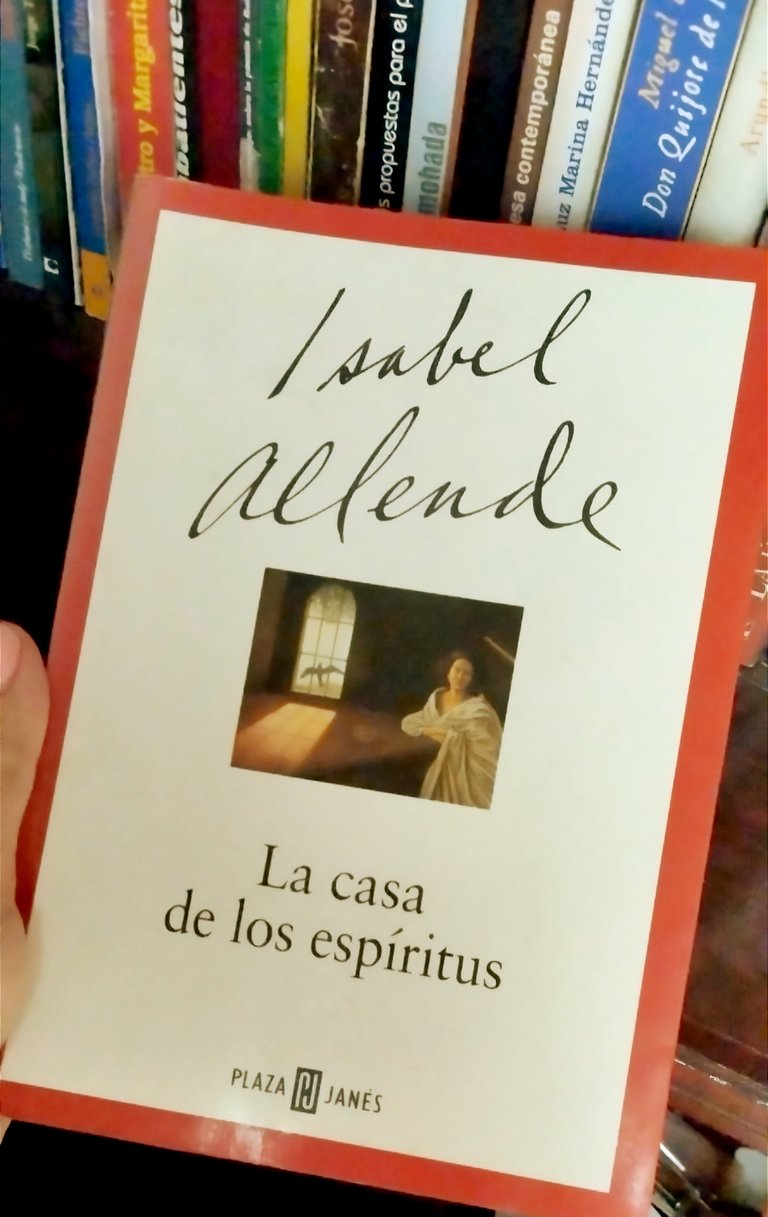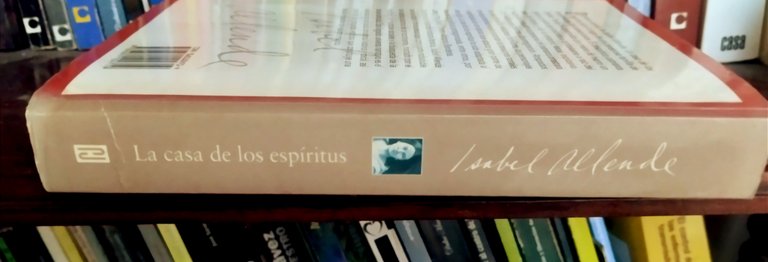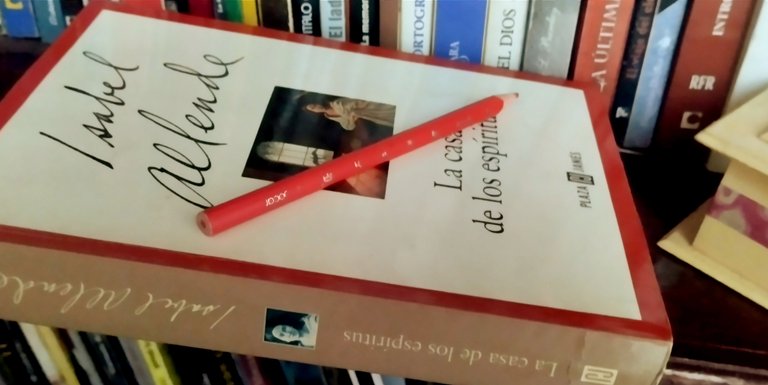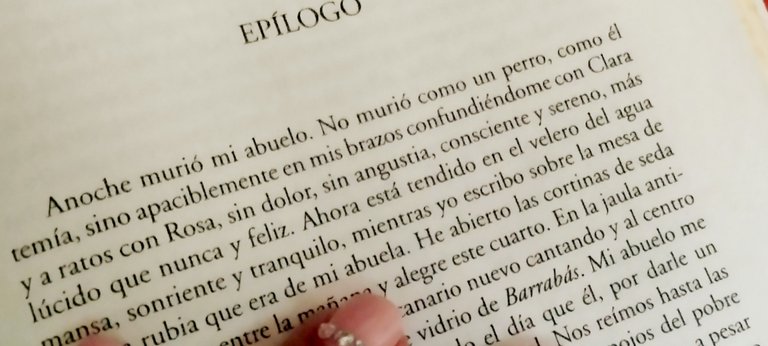La casa de los espíritus: Un grito mágico entre el amor y la rebelión | Reseña Literaria (Esp/Eng)
Hoy he pasado dos veces por mi biblioteca en trajines ajenos al ejercicio de la lectura, pero no pude evitar ver este ejemplar recostado al borde, como llamándome. Fue un regalo de un amigo, justo antes de mudarse a otro país, y ahora es mi tesoro.

Llego entonces a esta comunidad con La casa de los espíritus, la magistral obra de Isabel Allende que en 1982 la colocó en la cima de las letras latinoamericanas.
La novela sigue a cuatro generaciones de la familia Trueba-Del Valle en un país latinoamericano (presumiblemente Chile), desde principios del siglo XX hasta el estallido de una cruenta dictadura. A través de Esteban Trueba —un patriarca violento y ambicioso— y su esposa Clara, la narración enlaza de forma genial lo íntimo con lo histórico: amores, muertes, revoluciones sociales y la lucha entre el progreso y la opresión.
La historia se cuenta desde dos voces: la nieta Alba, que escribe en primera persona, y un narrador omnisciente que revela los secretos de los personajes. La casa de los espíritus simula entonces un grito político disfrazado de fábula, donde se retrata la opresión de las mujeres, los pobres y los disidentes, pero también su capacidad de resistir con amor y memoria, como la misma Alba, que ha decidido escribir para no olvidar.

Clara del Valle es el corazón místico de la novela. Desde niña, su conexión con lo sobrenatural define su existencia: posee poderes psíquicos, habla con espíritus, mueve objetos con la mente y predice catástrofes con sus cuadernos de anotar la vida. Tras presenciar un trauma, elige callar durante años, comunicándose solo con gestos y escritos. Su mutismo no es debilidad, sino un acto de rebeldía frente a la violencia encarnada en Esteban, su esposo.
Clara encarna el realismo mágico: lo extraordinario es cotidiano para ella, pero también representa la intuición femenina y la resiliencia ante el machismo y la represión.
¿Será Clara, entonces, una figura liberadora o escapista? ¿Su magia salva a la familia... o la aísla del mundo real?

Lo cierto es que enamoran todos sus personajes, desde la etérea Clara hasta el violento Esteban Trueba. Cada uno está lleno de matices y simbolismos. Allende rinde homenaje a García Márquez con toques sobrenaturales (espíritus, premoniciones) que se entrelazan naturalmente con la realidad.
Vale aclarar que el ritmo puede ser lento al inicio mientras se construye el mundo, pero vale la pena persistir. La prosa de Allende es poética y visual, como pintar con palabras.
Es una novela imprescindible dentro de nuestras lecturas, sobre todo porque es una obra que duele y encanta. En mi experiencia como lectora, pocas veces he llorado con un libro, y dentro de esas contadas ocasiones recuerdo el final: la muerte de Esteban, a quien tanto nos obligan a odiar y que terminamos amando irremediablemente.

Jamás dude usted, lector, en aventurarse dentro de estas páginas, especialmente si es amante del realismo mágico, las sagas familiares épicas y las historias con fuertes mujeres protagonistas.


ENGLISH
**The House of the Spirits: A Magical Cry Between Love and Rebellion | Book Review **
Today, I passed by my library twice, busy with tasks unrelated to reading, but I couldn’t help noticing this book lying on the edge, as if calling to me. It was a gift from a friend, just before they moved to another country, and now it’s my treasure.

So, I come to this community with The House of the Spirits, Isabel Allende’s masterful work that in 1982 placed her at the pinnacle of Latin American literature.
The novel follows four generations of the Trueba-Del Valle family in a Latin American country (presumably Chile), from the early 20th century to the outbreak of a bloody dictatorship. Through Esteban Trueba —a violent and ambitious patriarch— and his wife Clara, the narrative brilliantly intertwines the intimate with the historical: love, death, social revolutions, and the struggle between progress and oppression.
The story is told through two voices: the granddaughter Alba, who writes in the first person, and an omniscient narrator who reveals the characters’ secrets. The House of the Spirits thus becomes a political cry disguised as a fable, portraying the oppression of women, the poor, and dissidents, but also their capacity to resist through love and memory, much like Alba herself, who decides to write so as not to forget.

Clara del Valle is the mystical heart of the novel. From childhood, her connection to the supernatural defines her existence: she possesses psychic powers, speaks with spirits, moves objects with her mind, and predicts catastrophes in her life notebooks. After witnessing a trauma, she chooses to remain silent for years, communicating only through gestures and writing. Her muteness is not weakness but an act of rebellion against the violence embodied by her husband, Esteban.
Clara epitomizes magical realism: the extraordinary is mundane to her, yet she also represents feminine intuition and resilience in the face of machismo and repression.
So, is Clara a liberating figure or an escapist one? Does her magic save the family... or isolate it from the real world?

The truth is, all the characters are captivating, from the ethereal Clara to the violent Esteban Trueba. Each is full of nuance and symbolism. Allende pays homage to García Márquez with supernatural touches (spirits, premonitions) that blend seamlessly with reality.
It’s worth noting that the pacing may be slow at first as the world is built, but it’s worth persevering. Allende’s prose is poetic and visual, like painting with words.
This novel is essential reading, especially because it is a work that both hurts and enchants. In my experience as a reader, I’ve rarely cried over a book, and among those few occasions, I remember the ending: the death of Esteban, whom we’re compelled to hate but end up loving irrevocably.

Never hesitate, dear reader, to venture into these pages, especially if you love magical realism, epic family sagas, and stories with strong female protagonists.


Congratulations @neuropoeta! You have completed the following achievement on the Hive blockchain And have been rewarded with New badge(s)
Your next target is to reach 200 comments.
You can view your badges on your board and compare yourself to others in the Ranking
If you no longer want to receive notifications, reply to this comment with the word
STOPCheck out our last posts:
Excelente reseña, la has escrito de tal suerte que motiva, el que ama la lectura Ino la ha leído tratará de leerla de a todas y quien no tenga ese hábito, tu reseña lo dota de lo necesario para entender esa magistral obra literaria.
Y es que está novela no se puede dejar de leer. Muchos pueden estigmatizarla como lo hacen con la aurora, pero lo cierto es que la literatura latinoamericana no sería la misma sin La Casa de los Espíritus, ni sin Isabel Allende.
Qué maravilloso libro traes!!! Recuerdo que lo leí en mi adolescencia en dos días, ignorando las clases de matemáticas y física de la Vocacional jjjjj. Es que no podía dejar de leer.
Está reseña tuya es excelente y justa. 👌🏻👌🏻👌🏻👌🏻
Siempre lo quise leer, pero no lo había tenido jamás en mis manos. Hace poco más de dos años, un amigo que partía a otras tierras me lo dió y por él, guardo este tesoro. Igual que tú, lo leí con un hambre, con una voracidad increíble. Creo que de eso va la verdadera lectura, de leer lo que te apasione, lo que te abra las alas y la mente.
Así es, amiga mía. Y lo mejor es esa conexión que se logra entre una y el libro que se esté leyendo.